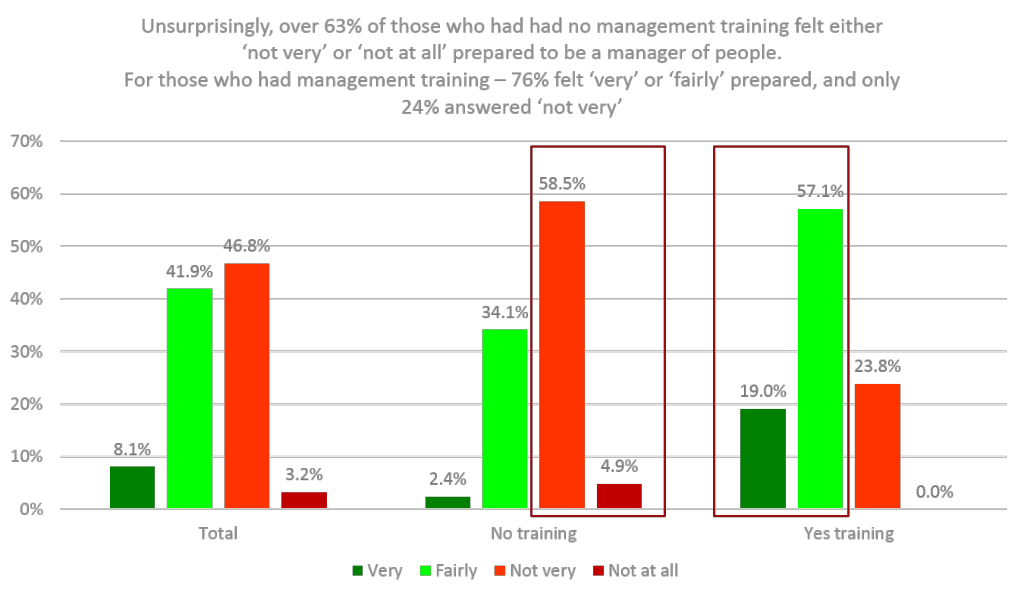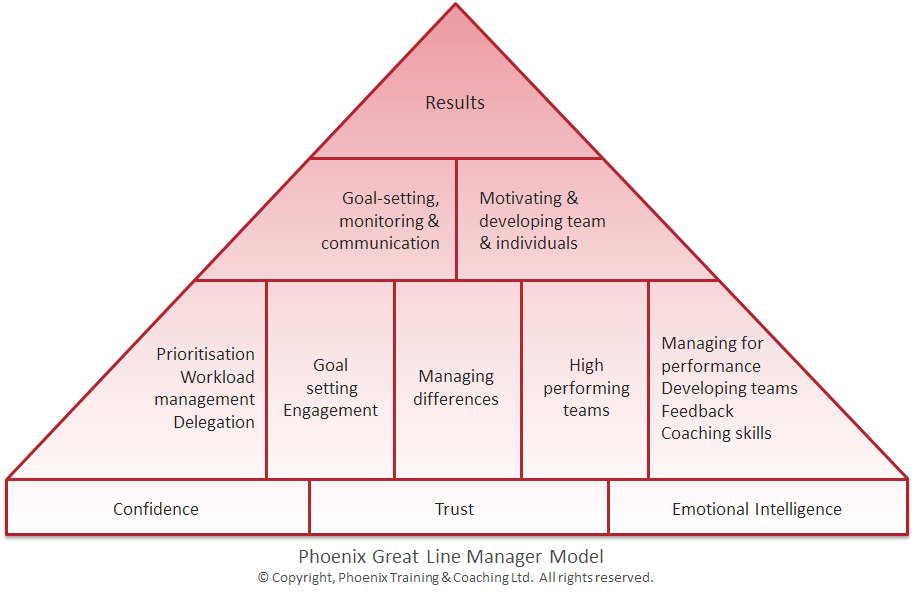How does your organisation prepare people for management responsibility? In a recent rough and ready online survey we conducted, we found that only 36% of people managers had received any formal management training before starting their first people management role As a manager, your job evolves from just being the ‘doer’ of a task to being responsible for managing these three key resources to achieve a goal: Money, time and people. And you may still have to balance that with performing a specific role. Take the example of a copywriter in the marketing department of an organisation Phoenix has worked with. Promoted to head of a small team, she not only needed to produce copy herself, she now needed to manage others to do the same, and support them in prioritising, communicating, developing in their roles. An entirely new skillset, and in many cases an undervalued change in role. The problem is that many organisations just tack the management side of the role onto the existing role, perhaps not even understanding that there is a difference in skillset and provide little training or support to do it, and then wonder why things are perhaps not running smoothly. In the case mentioned above, the copywriter’s organisation wisely invested in a development programme for new line managers from Phoenix, resulting in improved confidence, capability and a deeper appreciation of her new role. Is management right for everyone? First of all, not everyone wants management responsibility, but they may still want progression. So what opportunities is your organisation providing for people who want progression, development and a sense of responsibility – without managing people? Secondly, for those who are willing to be managers of people, how well are they prepared for this new and different role? In our survey, formal management training (or the lack of it) had a significant on how prepared respondents felt to be a manager of people. Unsurprisingly, over 63% of those who had no training felt either ‘not very’ or ‘not at all’ prepared to be a manager of people. Only 36.5% felt ‘fairly’ or ‘very’ prepared. These figures more than reverse for those who had had management training: Here, over 76% felt ‘fairly’ or ‘very’ prepared. So why does ‘feeling prepared’ matter? Well, it’s just one indicator of how engaged and motivated an employee is in their work. And there are many proven links between employee engagement, morale and retention level. All of which have financial implications. Other clear benefits of providing good quality training include: Setting clear standards for what is expected from people managers, demonstrating the value and importance of the role as separate from the technical aspect, and most importantly, the creation of effective people managers that add value and drive the organisation’s performance. The dangers of poor management The effects of poor management on an organisation can be huge, 0066rom missing objectives and poor product quality, to financial losses and the impact on people. According to the Hay Group as quoted in Personnel Today, “One in five UK workers is frustrated in their job, and the fault rests with their Line Manager.” The frustrations as quoted included a lack of authority to make decisions, poor handling of underperformance and the inability of managers to create productive working environments.[2] Another piece of research by KRI (Kenexa Research Institute) in 2009 stated that “Only 50% of UK employees rate their managers as effective, according to a survey of 22,000 staff in 18 countries. According to the survey, “being a ‘good manager’ has a significant impact on the engagement levels of staff and their overall perception of the company. Employees in the UK define a good manager as someone who keeps his or her commitments, evaluates employees’ performance fairly, makes use of employees’ ideas, quickly solves problems and practices open, two-way communication.”[3] The CMI recently published a survey of 750 of the UK’s top leaders, which identified priorities for where managers needed to excel in the next 10 years to ensure the UK economy is able to grow and compete. To quote, “The biggest rising priorities identified by managers include building partnerships and networking (cited by 87% and 78% respectively); creating agile teams and tackling underperformance (85% and 77%); using social media (79%); and managing complexity (76%).” Interestingly the research then looked at the perceived skills gaps, with many of the above skills showing as the biggest gaps. In fact, team management skills ranked as the third lowest rated skill amongst twenty assessed activities, where “34% are ineffective at decentralising decision making, 27% at creating agile teams and 24% at tackling underperformance.”[4] How to equip managers with the skills they require It’s pretty clear that further development and support is needed to improve the performance, quality and ‘future-proofing’ of the UK management population. The next question is ‘What and how to equip our managers with the skills they require?’ Our survey told us that even for those that had received training, fewer than 22% said it was adequate for them to manage staff effectively. A further 65% said it was only partly adequate. So there is room for improvement. A variety of topics had been covered in the training received by respondents, which Phoenix categorizes into two broad areas: – The ‘legal’ side of management, which includes administrative/HR/procedures, critical for the smooth and legal operating of the business – The ‘performance enabling’ side, which allow managers to get the best out of their people in order to meet the organisational objectives In our survey, the most common topics covered in training were coaching skills, setting objectives, managing different learning styles and different personality styles. Of course, there is no way of measuring the quality of the training provided or the level of support to embed it into the business, so no way of knowing why so few respondents said it was adequate. So what would we recommend? Phoenix has developed the ‘Great Line Manager Model’ to illustrate the key skills required within the ‘Performance enabling’ management skillset: Essentially, to get results, you need to set & communicate clear goals, then delegate effectively and support staff with managing their workload and prioritisation. And you need to develop your teams to deliver effective performance through the use of feedback, coaching, development reviews and an understanding of how high performing teams work. Both of these require an understanding of individuals’ different learning styles or preferences to get the best out of them. And most of us aren’t born knowing these skills, we have to learn them! Underpinning all of this is the development of self-confidence and emotional intelligence, and building trustful relationships between managers and staff. Our experience tells us that the ‘sheep dip’ approach of delivering a ‘one hit’ training in everything, all at once, to a big group, rarely works. Instead we tend to adopt a modular approach over a period of 3 – 5 months, with half day small-group sessions interspersed with one to one coaching, action learning sets and an expectation and opportunity to embed the skills learned in the workplace in between sessions. It can be adapted to all levels of management, builds on live workplace examples and experience, and creates a real focus on the value of the role of the manager. It gets great feedback, scoring an average of 9.3 out of 10 for ‘overall rating’ over the last 4 years, and more importantly delivers significant and sustainable changes in capability. So wherever your organisation is currently in terms of developing management capability, take a moment to reflect on how you could improve the effectiveness and preparedness of your people managers to deliver peak performance through your organisation’s most valuable asset: Its people. For more information, get a copy of the survey results summary or to discuss your needs with Phoenix, contact us on: [email protected] or call 020 3417 9284. [1] Source: Personnel Today, 30/7/08 [2] Source: Personnel Today, 27/11/09 (http://www.personneltoday.com/hr/just-half-of-uk-managers-are-effective-say-their-employees/) [3] Source: CMI (http://www.managers.org.uk/news/changing-world-work-must-drive-management-makeover) [4] Survey conducted by Phoenix Training & Coaching td. In September 2013. 64 respondents across gender, age group, industry who either are, or have been, managers of people.
That’s a pretty staggering statistic, if it proved to be representative of the general manager population. Without training, we’re asking people to take on a completely new responsibility, with its own discrete skillset, without any preparation. Like handing over the car keys to a complete novice and saying “Drive” or asking an incredible classroom teacher to take on the leadership and administrative responsibilities of a head teacher role. It doesn’t make sense, does it? Essentially, there’s an assumption that ‘everyone knows how to do it’, and that’s a big risk to take with your organisation’s most precious resource: Its people.



